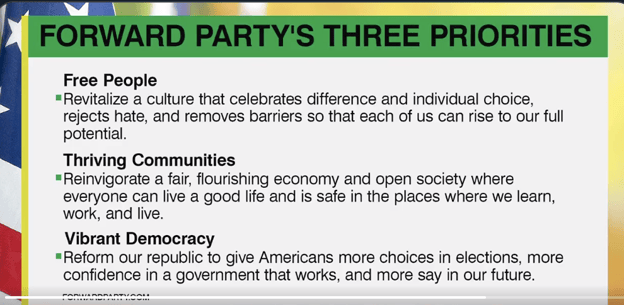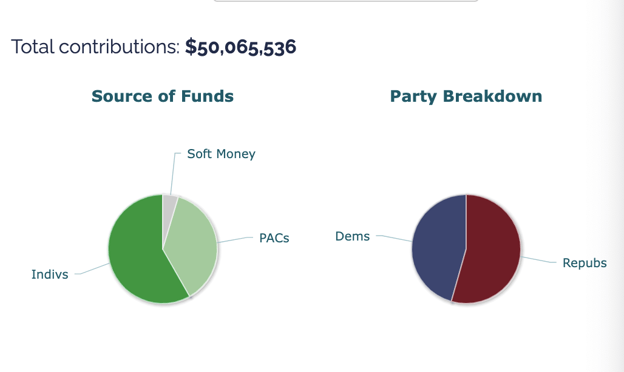
Where is the Forward Party Headed?
To present a viable alternative to the two dominant political parties, a third party must address material needs and directly counter the bipartisan consensus in Washington: warmaking, addiction to corporate money, and a senseless preoccupation with the political center.
Andrew Yang’s third party effort, The Forward Party, is off to a lackluster start, but most people have misdiagnosed why.
Partisans from both establishment parties have lobbed predictable criticisms: Democrats are worried about Forward Party candidates siphoning off Democratic votes in close elections, crying “spoiler effect.”
Other observers may be distrustful of a coalition that seems to be dominated by Republican politicians.
And then there’s the fact that the Party doesn’t seem to stand for anything in particular. The Forward Party’s Three ideological Priorities are “free people, thriving communities, and vibrant democracy.” But these declarations are so vague as to be essentially meaningless.

For instance, almost everyone can agree that recognizing freedom and individual choice is a good thing, but some Americans see the right of a woman to secure an abortion as a choice that a “free” person should have, while others don’t. Some Americans see freedom in having unrestricted access to guns, while still others believe that freedom from gun violence requires some regulation. Everyone wants a thriving, safe community, but some people believe that safety comes from funding already bloated police budgets, while others believe addressing poverty has a better chance at lowering crime.
A reasonable person could read this list and ask, So what exactly does this party stand for? What policies do they support? When people don’t know where you stand on policy, it’s not a good thing.

The Forward Party’s generic platform obscures real ideological differences. But that’s not a reason to dismiss the effort entirely. After all, ideological contradictions exist even within the Democratic Party. As a leftist and former Democrat, I am an expert on the tensions and contradictions within the Democratic Party. Recently, I wrote about how Nancy Pelosi has claimed to be pro-choice yet expresses support for anti-abortion sentiment within the Party. She and fellow senior establishment Democrat James Clyburn also recently stumped for congressman Henry Cuellar in Texas, despite the fact that Cuellar does not support abortion rights (and he voted against the house assault weapons ban). New York Mayor Eric Adams is a former cop who sees the police as the primary tool to address homelessness—an approach progressives view as criminalizing poverty while avoiding the root problem, all while driving up the costs of mass incarceration.
In the wake of George Floyd’s murder by police officers and the subsequent protests, which were unprecedented in scale, Joe Biden remained firm on his attitude toward police: We need to give more funding to police.

Which is all to say: it’s frustrating to see Andrew Yang, who has, in the past, demonstrated considerable talent in diagnosing the concerns of disaffected Americans, get things wrong when he insists that the main political problem we face is the left/right divide. He promotes T-shirts advertising the idea that the way to progress is not left or right, but forward.
But that’s the same misdiagnosis that Democrats make. The problem isn’t “the extremes on the left and the right” as a recent Forward Party tweet announced.
The real divide is top versus bottom.
Like corporate Democrats, the Forward Party has interpreted the widespread frustration with the two establishment parties as an interest in so-called “moderate” policies. The instinct to take this approach when knitting together a coalition is understandable, but it’s wrong. The truth is that individual Americans hold a whole host of disparate political and cultural views that often fail to neatly align with one party or another. Independents aren’t the platonic average of a Democrat and Republican. They’re economic populists who feel left behind by changing cultural norms. They’re Reagan Republicans spooked by the far right’s open embrace of theocracy, obsessive focus on pronouns, and abandonment of deficit hawkery. They’re union families who used to vote Democrat but who have been disappointed by decades of bipartisan deals to ship jobs overseas. They’re veterans frustrated by the bipartisan consensus on supporting forever wars. They want legal weed and free speech. They’re more Joe Rogan than Liz Cheney.
If the Forward Party doesn’t figure out how to knit together that coalition, it’s dead on arrival.
Luckily, there is a realistic path forward.
Principles Necessary to go Forward
The Forward Party members don’t need to agree on everything, but to offer a true alternative to the two parties, they do need to agree on two principles:
- They need to be an anti-war party
- They need to make a commitment to never take corporate money
The reason for the first prong is obvious. Anti-war sentiment is driving support for right-wing populist candidates and left candidates alike. It’s what made heroes out of characters as diverse as Barbara Lee, Tulsi Gabbard, Marjorie Talyor Greene, Mike Lee, and Bernie Sanders. Republican Mike Lee and Independent Bernie Sanders famously collaborated on a bill to rein in executive powers on matters of war and national security. Bernie and Rand Paul collaborated on the Yemen War Powers Resolution. Both the Bernie left and the far right are livid about billions going out the door to Ukraine while gas and food prices remain high at home. Being an anti-war party is a no-brainer—especially when you consider that so much of the hawkery in the two major parties is driven by the subject of my second prong: corporate lobbyists.
The Forward Party must eschew corporate money.
Democrats and Republicans aren’t out of touch with the American people because they woke up one day and chose to be useless. It’s worse than that. They’re paid to be useless.

Defense contractors contributed over $50 million to political campaigns in 2020, with a fairly even split between Republicans and Democrats.

Source: Open Secrets
Raytheon gave over half a million dollars to Joe Biden’s 2020 campaign alone. Lockheed Martin over $440,000. Over $700,000 from Boeing and over $400,000 from Northrop. These companies subsequently lobbied the administration to continue to send weapons to Saudi Arabia, where they’re used to commit atrocities against the Yemeni people. A bomb that obliterated a Yemeni school bus—killing more than 40 children—was later identified as being manufactured by Lockheed Martin.
No voters benefit from this, and it’s hard to see how any voter could support this. But it happens anyway because, as I’ve explained repeatedly on Bad Faith Podcast and on Rising, we don’t live in a democracy. A 2014 study showed that there is no relationship between what the people want and what congress delivers. The reason is corporate capture. Why would a new party that hopes to correct what is wrong with the two existing corporate parties court the same corporate funding base that has ruined both Democrats and Republicans in the first place?
There is always bipartisan support for war. Over two dozen Republican senators issued a statement last week in support of Nancy Pelosi’s visit to Taiwan.
And similarly, there’s always bipartisan support for our privatized healthcare system that commodifies your loved one’s cancer diagnosis and offers you care only if you have money. Just like there’s a bipartisan consensus against taxing the rich and breaking up the banks. Just like there’s a bipartisan consensus to put more Americans in jail, privatize social security, and ignore the student debt crisis. How else would they find grist for the war profiteering machine if they couldn’t lure young people into the army with military benefits paying for higher education and healthcare?
Want to know what’s wrong with America? Take a look at this embedded tweet below, which shows Canadian millionaire Kevin O’Leary responding to an Oxfam study revealing that “the world’s 85 richest people have equal wealth to the 3.5 billion poorest people.”
It’s officially time to eat the rich pic.twitter.com/getjyh1erR
— ashok kumar 🇵🇸 (@broseph_stalin) August 2, 2022
“It’s fantastic,” he said. “It inspires everybody, gets them motivation to look up to the 1% and say, ‘I want to become one of those people, I’m going to fight hard to get up to the top.’”
By contrast, Bernie Sanders repeatedly speaks out against such “obscene” inequality and has attracted the respect of people like Joe Rogan, who believe Bernie is genuinely trying to improve the lives of average working people. The reason Bernie has earned that trust is that he’s worked in Congress for 40 years with consistent messaging and doesn’t take corporate PAC money. In 2020, Bernie managed to out fundraise a crowded Democratic primary field. Voters understood that if they funded his campaign, he’d be accountable to them, not Lockheed Martin.

Bill Maher is Wrong about the Middle
It seems obvious to me that independents want, well, political independence. And you get that by being financially independent. (Note that Trump and Bloomberg’s vast wealth made them financially independent, but because they weren’t dependent on the people for funding, they still were corrupted by their own personal interests, and largely indifferent to working class priorities.)
But according to the big brains in centrist land—a land that only exists on network TV—all that matters is being of the “middle.” Take a listen to Bill Maher’s take on this idea:
“You could have a sensible middle party. … And it would force the Democrats to go back to being the sensible middle party. And they would. Because they would see that’s where … Biden reminds me of some grandfather. When AOC and the woke people come into his office, he just goes along.“
This commentary makes no sense. Biden made campaign promises related to policies that were popular—which helped him get elected—but he has reneged on them. That isn’t a “capitulation” to the Left, though. Biden has done nothing but thumb his nose at the Left. For example, he is calling for more funding for police and failing to address climate change as the emergency that it is. People voted for him because he promised to do something. And now that he hasn’t, the elite commentariat predictably blames the very group he has ignored.
The truth is that Americans don’t want some imaginary “middle.”
- 70 percent of Americans want Medicare for All.
- 68 percent want marijuana legalization.
- 83 percent want Medicare to negotiate drug prices.
- 71 percent want a higher minimum wage, including 72 percent of independents.
- 68 percent want a tax on ultra millionaires.
- Majorities of Americans across most demographic and political groups oppose cuts to Social Security
And guess what? We have zero political parties running on such a platform. Also, if you’re waiting for millionaire talk show hosts to back these proposals, don’t hold your breath. (But they might support pot legalization, because that one helps them.)

But, I promise. Just like corporate politicians, talk show hosts aren’t looking out for you.
When it comes to politics, when you try to find the “average” voter, no one is there. And if that’s difficult to understand, consider this: In the 1940s, the U.S. air force couldn’t figure out why their planes kept crashing. Although technology had advanced, birds kept falling out of the sky—on the worst day, 17 pilots crashed in a single day. They couldn’t figure out why until someone realized that the cockpits had been designed to fit the “average” pilot. In 1926, when the army was designing the first cockpit, it took the measurements of hundreds of pilots and made a standardized cockpit. The problem was no single pilot matched the measurements of the “average” composite pilot. Out of over 4,000 pilots measured, none of them had the dimensions of the “average” pilot.
The lesson? Well, in the words of the young man who finally solved the puzzle of the crashing planes: “The tendency to think in terms of the average man is a pitfall into which many persons blunder.”
Hopefully, the lesson here is obvious. Americans have a great many needs. And the way to form a coalition is to address these needs, not to speak in the generalized platitudes coming from the Forward Party.

Here’s another great idea: stop trying to get people to forget their empty fridges and gas tanks by leaning on empty identity politics and calling material economic concerns “privileged,” as some elite pundits say, this one from MSNBC: Inflation, it’s almost a privilege to care about inflation as your number one issue. The same is true of gas prices or even the idea that ‘it’s the economy, stupid.’
It’s also wrong to do what the Republicans are doing, which is to blame everyone else for inadequate solutions while offering none of your own. “I don’t care about pronouns” is not a policy to lower prices at the grocery store. Taxing price gougers and breaking up meat monopolies is. Criticizing the money going to Ukraine while people suffer at home is a morally bankrupt exercise if you don’t support actually spending that money on Americans.
Banning books doesn’t address the education crisis. Funding public colleges and vocational schools does. And hating “woke” culture is not a substitute for doing the bare minimum, like voting to help veterans exposed to burn pits.
Criticizing Dems is cool. I do it, too. But doing so—such as when Republicans voted against Build Back Better legislation to address healthcare costs and coverage—without offering solutions amounts to selling snake oil to Americans who desperately need real medicine.
I want to root for the Forward Party. I think it’s important to support third parties on principle, and I think it’s important to have a well-funded effort to push rank choice voting and secure ballot access for all types of third party campaigns. But if the Forward Party wants the trust of the public—if it wants to avoid becoming the third head of corporate Cerberus—it must decline to suckle at the teat that feeds the beast: corporate money.





